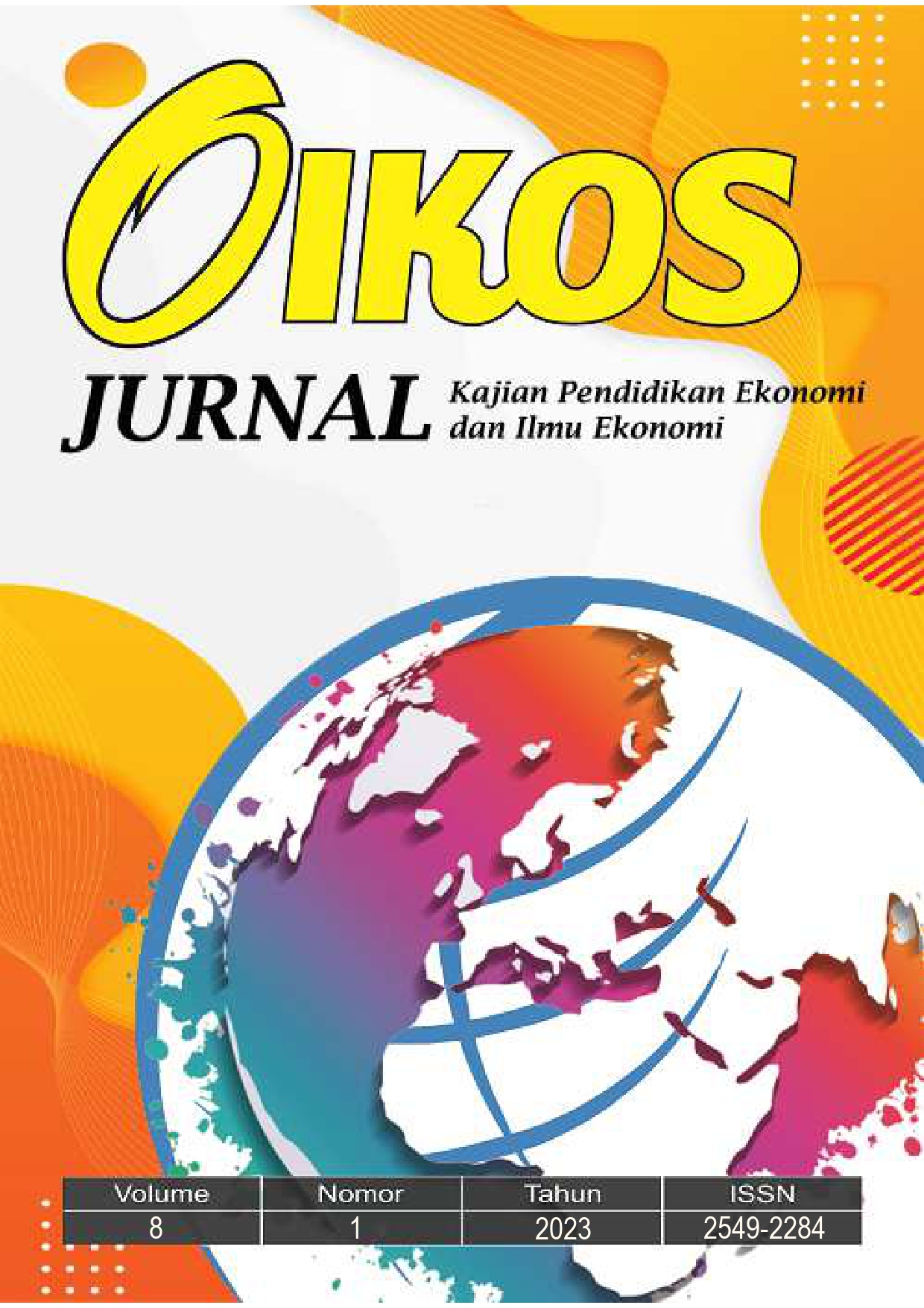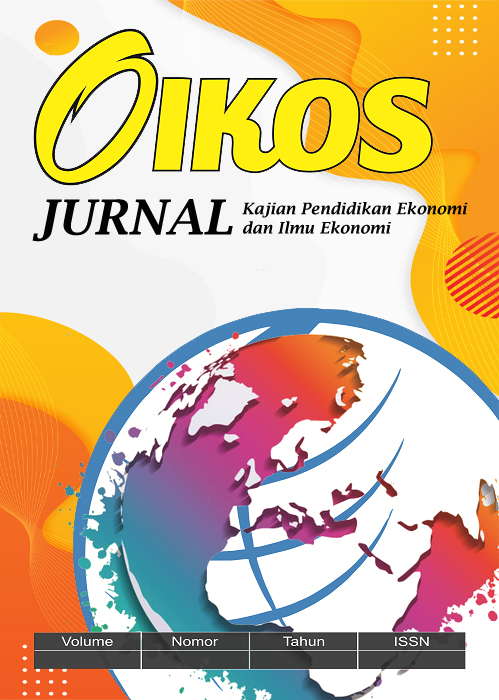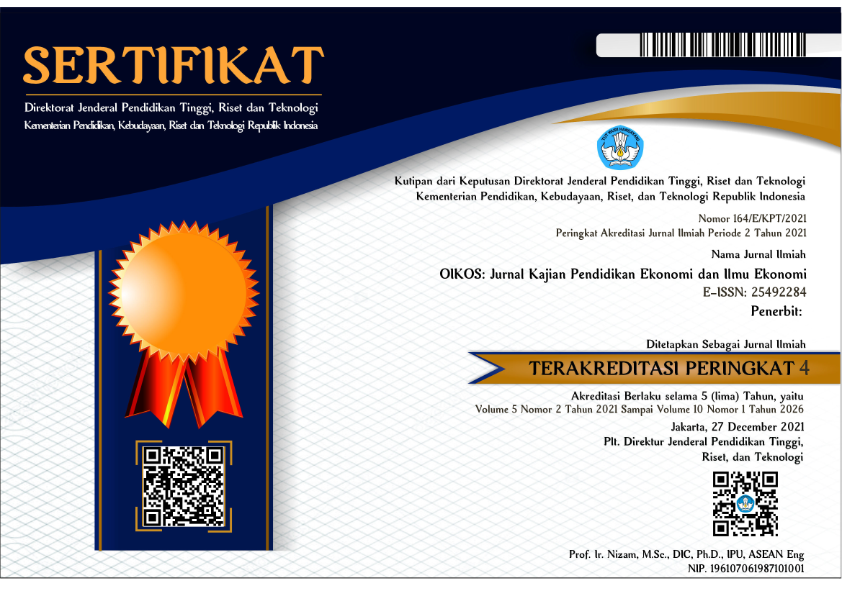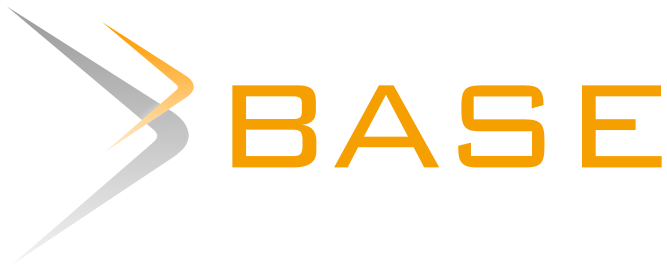A BIBLIOMETRIC ANALYSIS: PENELITIAN ENTREPRENEURIAL KNOWLEDGE PADA TAHUN 2019 – 2023
DOI:
https://doi.org/10.23969/oikos.v8i1.10727Keywords:
Entrepreneurial Knowledge, BibliometricAbstract
The purpose of this research is to find out the publication trends related to entrepreneurial knowledge in the last five years. The database used is Scopus. The method used is bibliometric descriptive analysis. The research phase included identification, screening, eligibility assessment, and inclusion, resulting in 123 publications as final data. The results show that the number of publications related to entrepreneurial knowledge has increased in recent years. Indonesia and Malaysia have significant influence on research in this field compared to other countries. These studies focus on three main areas, namely: 1) entrepreneurial knowledge, enterprise intention, and enterprise education; 2) entrepreneurship, and self efficacy; and 3) knowledge and entrepreneur. The new themes that emerged in the study include self efficacy, entrepreneurial passion and entrepreneur self effecacy.
Downloads
References
Adnyana, I. G. L. A., & Purnami, N. M. (2016). 253915-Pengaruh-Pendidikan-Kewirausahaan-Self-E-18441d7f. E-Jurnal Manajemen Unud, 5(2), 1160–1188.
Anggraeni, B., & Harnanik. (2015). Pengaruh Pengetahuan Kewirausahaan Dan Lingkungan Keluarga Terhadap Minat Berwirausaha Siswa Kelas XI SMK Islam Nusantara Comal Kabupaten Pemalang. X(1), 42–52.
Angraini, L. M., Alzaber, A., Sari, D. P., Yolanda, F., & Muhammad, I. (2022). Improving Mathematical Critical Thinking Ability Through Augmented Reality-Based Learning. Aksioma: Jurnal Program Studi Pendidikan Matematika, 11(4), 3533. Https://Doi.Org/10.24127/Ajpm.V11i4.5968
Franco, M., Haase, H., & Lautenschläger, A. (2010). Students’ Entrepreneurial Intentions: An Inter-Regional Comparison. Education + Training, 52(4), 260–275. Https://Doi.Org/10.1108/00400911011050945
Gurel, E., Altinay, L., & Daniele, R. (2010). Tourism Students’ Entrepreneurial Intentions. Annals Of Tourism Research, 37(3), 646–669. Https://Doi.Org/10.1016/J.Annals.2009.12.003
Hendrawan, J. S., & Sirine, H. (2017). Pengaruh Sikap Mandiri, Motivasi, Pengetahuan Kewirausahaan Terhadap Minat Berwirausaha. Asian Journal Of Innovation And Entrepreneurship, 02(03), 291–314. Https://Doi.Org/10.1097/Scs.0b013e318240fa84
Karyaningsih, R. P. D., Wibowo, A., Saptono, A., & Narmaditya, B. S. (2020). Does Entrepreneurial Knowledge Influence Vocational Students’ Intention? Lessons From Indonesia. Entrepreneurial Business And Economics Review, 8(4), 138–155. Https://Doi.Org/10.15678/Eber.2020.080408
Liñán, F. (2004). Intention-Based Models Of Entrepreneurship Education. Piccola Impresa/Small Business, 3, 1–30.
Liñán, F., Rodríguez-Cohard, J. C., & Rueda-Cantuche, J. M. (2011). Factors Affecting Entrepreneurial Intention Levels: A Role For Education. International Entrepreneurship And Management Journal, 7(2), 195–218. Https://Doi.Org/10.1007/S11365-010-0154-Z
Maryanto, B. P. A., Rachmawati, L. N., Muhammad, I., & Sugiyanto, R. (2023). Kajian Literatur: Problematika Pembelajaran Matematika Di Sekolah. Delta-Phi : Jurnal Pendidikan Matematika, 1(2), 93–106.
Memon, M., Soomro, B. A., & Shah, N. (2019). Enablers Of Entrepreneurial Self-Efficacy In A Developing Country. Education And Training, 61(6), 684–699. Https://Doi.Org/10.1108/Et-10-2018-0226
Moher, D., Liberati, A., Tetzlaff, J., & Altman, D. G. (2009). Preferred Reporting Items For Systematic Reviews And Meta-Analyses : The Prisma Statement. Annals Of Internal Medicine, 151(4), 264–269.
Muhammad, I., Darmayanti, R., & Arif, V. R. (2023). Discovery Learning Research In Mathematics Learning : A Bibliometric Review. Delta-Phi : Jurnal Pendidikan Matematika, 1(1), 72–84.
Otache, I., Umar, K., Audu, Y., & Onalo, U. (2021). The Effects Of Entrepreneurship Education On Students’ Entrepreneurial Intentions: A Longitudinal Approach. Education And Training, 63(7–8), 967–991. Https://Doi.Org/10.1108/Et-01-2019-0005
Pujiastuti, Y., & Filantrovi, E. W. (2018). Gambaran Minat Kewirausahaan Mahasiswa ( Studi Terhadap Mahasiswa Stie Bank Bpd Jateng ). Jurnal Manajemen, 15(2), 169–180.
Robyardi, E. (2012). Minat Berwirausaha Mahasiswa Fakultas Ekonomi Universitas PGRI Palembang. Jurnal Media Wahana Ekonomika, 8(4), 17–23.
Rosmiati, Junias, D. T. S., & Munawar. (2015). Sikap, Motivasi, Dan Minat Berwirausaha Mahasiswa. Jurnal Manajemen Dan Kewirausahaan, 17(1), 21–30. Https://Doi.Org/10.21070/Jkmp.V5i2.1310
Roxas, B. G., Cayoca-Panizales, R., & Mae De Jesus, R. (2008). Entrepreneurial Knowledge And Its Effects On Entrepreneurial Intentions : Development Of A Conceptual Framework. Asia-Pacific Social Science Review, 8(2), 61–77.
Saptono, A., Wibowo, A., Narmaditya, B. S., Karyaningsih, R. P. D., & Yanto, H. (2020). Does Entrepreneurial Education Matter For Indonesian Students’ Entrepreneurial Preparation: The Mediating Role Of Entrepreneurial Mindset And Knowledge. Cogent Education, 7(1). Https://Doi.Org/10.1080/2331186x.2020.1836728
Siahaan, E. Y. S., Muhammad, I., Dasari, D., & Maharan, S. (2023). Research On Critical Thinking Of Pre-Service Mathematics Education Teachers In Indonesia (2015-2023): A Bibliometric Review. Journal Math Educator Nusanatara, 9(1), 34–50.
Siswoyo, B. B. (2009). Pengembangan Jiwa Kewirausahaan Di Kalangan Dosen Dan Mahasiswa. Jurnal Ekonomi Dan Bisnis, 14(2), 114–123.
Soraya, S. M., Kurjono, & Muhammad, I. (2023). Analisis Bibliometrik: Penelitian Literasi Digital Dan Hasil Belajar Pada Database Scopus (2009-2023). Edukasia: Jurnal Pendidikan Dan Pembelajaran, 4(1), 387–398.
Sudirman, L., Damirah, D., & Budiono, I. N. (2018). Pengembangan Minat Berwirausaha Pada Mahasiswa Sekolah Tinggi Agama Islam Negeri (STAIN) Parepare. Diktum: Jurnal Syariah Dan Hukum, 16(1), 16–31. Https://Doi.Org/10.35905/Diktum.V16i1.519
Sudrajat, Y. (2015). Peningkatan Minat Mahasiswa Berwirausaha. Sosio-E-Kons, 7(3), 246–254.
Triansyah, F. A., Muhammad, I., Rabuandika, A., Siregar, K. D. P., Teapon, N., & Assabana, M. S. (2023). Bibliometric Analysis: Artificial Intelligence (Ai) In High School Education. Jurnal Imiah Pendidikan Dan Pembelajaran, 7(1), 112–123. Https://Doi.Org/10.23887/Jipp.V7i1.59718
Wu, Y. C. J., Wu, T., & Li, Y. (2019). Impact Of Using Classroom Response Systems On Students’ Entrepreneurship Learning Experience. Computers In Human Behavior, 92, 1–12. Https://Doi.Org/10.1016/J.Chb.2017.08.013
Downloads
Published
Issue
Section
License
Copyright (c) 2024 OIKOS: Jurnal Kajian Pendidikan Ekonomi dan Ilmu Ekonomi

This work is licensed under a Creative Commons Attribution 4.0 International License.









